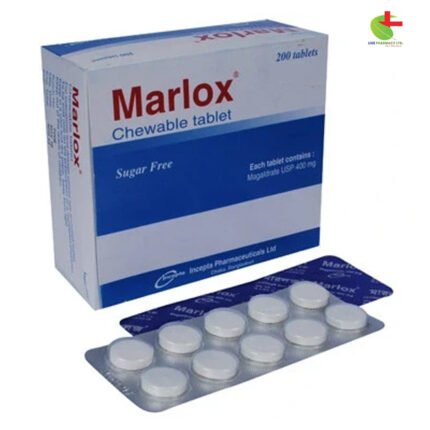Linamet ER 5/1000
144.00৳ Strip
- Linamet ER is a combination medication for improving blood sugar control in adults with type 2 diabetes.
- Combines Linagliptin (DPP-4 inhibitor) and Metformin Hydrochloride (biguanide) to regulate blood glucose levels.
- Used alongside diet and exercise to manage diabetes.
- Take as prescribed by your healthcare provider for safe and effective use.
 Brand
Brand
|
Incepta Pharmaceuticals Ltd |
|---|---|
 Generics
Generics
|
Linagliptin + Metformin Hydrochloride |
 Type
Type
|
Tablet |
Indications
Linamet ER is prescribed as an adjunct to a healthy diet and exercise plan to improve blood sugar control in adults with type 2 diabetes mellitus. This combination of Linagliptin and Metformin Hydrochloride is used when both medications are deemed appropriate by a healthcare provider.
Follow your doctor’s advice for proper usage.
Pharmacology
Linagliptin enhances glycemic control in individuals with type 2 diabetes by inhibiting DPP-4, an enzyme responsible for breaking down incretin hormones like GLP-1 and GIP. This increases the levels of active incretin hormones, promoting insulin secretion from the pancreas in response to glucose and reducing glucagon production.
Metformin Hydrochloride, an oral biguanide, works by lowering blood sugar levels, both before and after meals. Unlike sulfonylureas, it does not cause hypoglycemia. It reduces glucose production in the liver, lowers glucose absorption from the intestines, and improves insulin sensitivity in the body.
Dosage & Administration
Linamet ER should be dosed based on individual effectiveness and tolerance, with gradual dose adjustments to minimize gastrointestinal (GI) side effects.
- Immediate Release Tablets:
- Initial Dose: 2.5 mg Linagliptin + 500 mg Metformin Hydrochloride twice daily.
- Maximum Dose: 2.5 mg Linagliptin + 1000 mg Metformin Hydrochloride twice daily with meals.
- Adjust the dosage as needed based on individual tolerance.
- Extended Release Tablets:
- Start with 5 mg Linagliptin + 1000 mg Metformin Hydrochloride once daily with a meal.
- Maximum daily dose: 5 mg Linagliptin + 2000 mg Metformin Hydrochloride.
Always follow your healthcare provider’s instructions.
Drug Interactions
- Cationic Drugs: Certain drugs (like digoxin, morphine, and ranitidine) may interact with Metformin, affecting its elimination. Monitor and adjust doses carefully.
- Carbonic Anhydrase Inhibitors: Drugs like Topiramate may increase the risk of metabolic acidosis when used with Linamet ER.
- P-glycoprotein Inducers: Rifampin may reduce Linagliptin effectiveness, suggesting the need for alternative treatments.
- Glycemic Control Medications: Medications like diuretics, corticosteroids, and phenytoin may interfere with glycemic control. Monitor blood sugar closely when using these drugs with Linamet ER.
Contraindications
Linamet ER is contraindicated in patients with severe kidney impairment or metabolic acidosis (e.g., diabetic ketoacidosis). It is also not suitable for individuals with a known hypersensitivity to Linagliptin or Metformin Hydrochloride.
Common Side Effects
- Nasopharyngitis
- Diarrhea
- Increased risk of hypoglycemia when combined with sulfonylureas.
Consult your doctor if side effects persist or worsen.
Pregnancy & Lactation
- Pregnancy: There are limited studies on the use of Linamet ER during pregnancy. It should be used only if clearly needed.
- Lactation: Caution is advised as both Linagliptin and Metformin Hydrochloride may pass into breast milk.
Warnings & Precautions
- Lactic Acidosis: This rare but serious condition can occur in patients with kidney problems or other severe health issues. Symptoms include muscle pain, tiredness, and stomach discomfort.
- Pancreatitis: There have been reports of acute pancreatitis in some patients taking Linagliptin. Seek medical attention if you experience severe stomach pain.
- Alcohol: Avoid excessive alcohol consumption as it can increase the risk of hypoglycemia.
- Radiological Procedures: Temporarily stop using Linamet ER before certain diagnostic tests or surgeries involving contrast agents.
Overdose
In case of overdose, supportive measures should be taken. Metformin Hydrochloride can be removed through dialysis, but Linagliptin is not dialyzable. Monitor for symptoms of lactic acidosis and initiate treatment immediately if needed.
Storage Conditions
Store Linamet ER in a cool, dry place, away from light and moisture, and out of the reach of children. Keep the product below 30°C.













Reviews
There are no reviews yet.